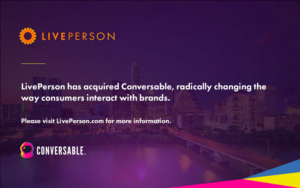The Texas chatbot startup Conversable, founded by serial entrepreneur Ben Lamm along with Andrew Busey and Tony Chen was acquired for an undisclosed amount by LivePerson, the online messaging pioneer, earlier this month. Lamm and Busey are expected to transition out, leaving the 28-member team which will become the staff of LivePerson’s new Austin, Texas office.
The acquisition follows Conversable’s three-year long run of partnering with prominent brands to power their customer support operations. The company is a SaaS conversational AI platform, and its solution allows companies like TGI Friday’s, Pizza Hut, Dunkin’ Donuts, Sam’s Club, Whole Foods, and Booz Allen. These clients have used Conversable to build automated conversations through chatbots to answer customer queries, complete simple tasks, and even proactively engage in campaigns to increase brand loyalty.
For companies, chatbots have represented a new and exciting way to interact with customers. According to market intelligence from Zion Market Research, the global chatbot market is expected to grow at a CAGR of 28.73% from 2018 to 2024 and be worth $2B+.
Conversable Chatbots
Creating machines capable of holding a conversation with human beings has been an old goal for technology. The Turing Test has long been considered the point at which Artificial Intelligence would be understood to have reached human capacity. However, until recently, chatbots worked largely by finding keywords in the input text and fetching the pre-programmed response to the keyword from a database of stock outputs. This was the underlying method behind Joseph Weizenbaum’s ELIZA in 1966. Weizenbaum was taken aback at the number of people who attributed human-like feelings to the program, including his own secretary.
Early examples of chatbots were extremely limited, regardless of the feelings of Weizenbaum’s secretary. The Turing Test remained a big hurdle, as the best way to determine whether one was speaking to a bot or not was to see the response to unexpected questions which the program didn’t have a stock response to. As time went by, the data storage and processing capacity of these systems continued to improve, and other chatbots followed.
PARRY (1972), A.L.I.C.E, (1995), Jabberwacky (1997), and its successor Cleverbot (2008) were all examples of this generation of chatbots, with the later iterations having a deeper database of responses and could be more interactive. However, all these softwares were fundamentally incapable of doing more than reflecting the intelligence of the programmer and the Turing Test remained safe – until Natural Language Processing came of age.
Chatbots get smart
Increasing data storage and processing capacity, as well as breakthroughs in computing architecture such as deep learning neural networks helped develop chatbots which could do more than just match keywords. These new-age chatbots managed to create chatbots which were more fundamentally capable of showing actual understanding of their input, choosing between different responses due to context and nuance. Google’s Duplex effortlessly seemed to beat the Turing Test in a call during the Google I/O event, using Google’s DeepMind AI.
At Techweek, we have covered this topic before, given the growing utility that chatbots have for business. Conversable has tapped into a feeling among companies and retailers that they need to connect to customers in a better fashion at a time when service is expected to be instantaneous. Acknowledgement and contact has to happen on demand, and customers continue to show a preference of interacting with brands through texting and messaging apps rather than phone calls.
Matching these standards through human resources is costly and time-consuming. Conversable offers clients tech-powered tools which can boost efficiency, cut costs, and improve customer experience substantially. The company was founded in 2016, and launched in June of that year offering customers of Wingstop, a Dallas eatery, the ability to order Atomic Wings off Facebook or Twitter. Since then, the company has continued to tap into ‘conversational commerce’, expanding to other clients and offering integration with a larger spectrum of platforms – Messenger, Twitter, We, SMS, Alexa, Google Assistant, and even in cars with GM Onstar.
Acquisition by LivePerson
Conversable’s focus on ‘conversational commerce’ brought it to the attention of one of the largest names in the space, LivePerson. The New York-based company provides 18,000 companies over the world real-time customer engagement, using automation and tools to improve the relationship between brands and customers. LivePerson was founded back in 1995 to create more ‘meaningful connections’. LivePerson had an IPO and was listed on the NASDAQ 5 years later. Today, the company has offices in London, Berlin, Paris, Tel Aviv, San Francisco, Atlanta, Tokyo, Melbourne, Mannheim, Amsterdam, Milan in addition to its headquarters in New York. After acquiring Conversable, the company will have a new location in Austin, Texas too.
Conversable is LivePerson’s 11th acquisition.
Conversable is the 11th acquisition by the customer interaction automation giant. LivePerson CEO Robert LoCascio, in conversation with VentureBeat, said – “Conversable brings to LivePerson proven social listening and outbound marketing capabilities that enhance conversational commerce, along with a set of templates and integrations that accelerate bot development for common consumer tasks, like ordering ahead at a restaurant.”
Conversable’s ability, then, to use chatbots to accomplish different consumer-facing tasks was of importance to LivePerson. Its ability to integrate with Amazon’s Alexa and Google’s Assistant gave it an edge on future functionality development. The company had already worked with the network BET to launch a Facebook Messenger-based chatbot for marketing, a Twitter-bot for taking orders for TGIF, a query-answering bot for Shake Shack, and making on-demand commercial services available for millions of internet-enabled GM vehicles.

The announcement on Conversable’s website
Only time will tell how LivePerson’s acquisition of Conversable will play out. LivePerson’s long history of customer interactions and large customer base, combined with Conversable’s dynamic technology platform, has a lot of potential. In a world where conversation is taking centerstage, Conversable and the sector at large will see a lot of change.
Subscribe to our newsletter



